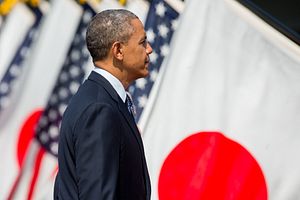U.S. President Barack Obama’s trip to Asia is drawing to a close this week. Obama arrived in the Philippines, the last stop on his tour, today. As expected, Obama’s trip to Manila was accompanied by the formal signing of a new defense agreement that will give U.S. troops access to certain Philippine military bases. Despite numerous protestations by Obama and Aqunio that the new deal was not targeting China, that’s exactly how popular perceptions paint the new agreement: as a counter-measure to China’s rise. In fact, to many, that’s the entire purpose of the U.S. “pivot” or “rebalance” to Asia.
However, despite a flurry of commentary and op-eds on this subject in advance of Obama’s trip, Chinese media and officials are currently reserving judgment on the broader implications. In Monday’s press conference, when asked about China’s take on Obama’s visit to Asia, Foreign Ministry Spokesman Qin Gang offered a wait-and-see approach. “Whether [the trip] is to counter China or not,” Qin said, “we will tell based on what the U.S. says and does.” Qin expressed China’s hope that U.S. engagement in Asia will follow the Asia-Pacific “trend” of “peace, development and win-win cooperation.”
Even with regards to the new U.S.-Philippines defense cooperation agreement, Qin’s response was restrained. He noted Obama’s repeated reassurances that the U.S. does not intend to contain China, and again said that China will be watching “what the U.S. says and does” to evaluate this claim. Qin also added that the U.S. and China share “a wide range of common interests in the Asia-Pacific,” a more optimistic note than might have been expected after the U.S. inked a defense agreement with one of the most vocal parties in China’s maritime disputes.
That’s not to say that China is convinced that the “pivot to Asia” is benign. An article in Global Times suggested that Obama was rewarding Malaysia with a visit in part because Kuala Lumpur recently shifted its stance on maritime disputes with China. Prior to that, the article said, Malaysia “was a missing element in Washington’s strategy to utilize South China Sea claimants to hedge China’s growing military assertiveness.”
Likewise, a commentary in Xinhua warned that the Philippine government might use increased defense ties with the U.S. as leverage to confront China. However, Xinhua framed this as a common danger for both China and the U.S.: “A more assertive or even reckless Manila would stoke regional tensions and in turn upset Obama’s policy of rebalancing,” the article said. The article even noted approvingly that Obama had “shattered [its allies’] illusion that Washington might support them at all costs in their territorial disputes with China.”
This sentiment was in direct opposition to the flurry of articles condemning Obama’s reassurance to Japan that the Senkaku/Diaoyu Islands would be covered by the U.S.-Japan defense treaty. “Obama’s defense commitment would leave the United States hijacked by Japanese rightwing forces and turn Japan-U.S. military alliance into a war machine,” one commentary in Xinhua warned. An article in People’s Daily argued that “America’s pursuit of its own private interests at the expense of postwar peace is encouraging Japan’s excesses.”
The different media responses may be sending a message to Washington: Beijing is willing to accept the pivot as long as it does not result in a militarized Japan. Obama’s visits to South Korea, Malaysia, and even the Philippines were met with fairly mild responses from China’s media and officials. It was only Obama’s stop in Tokyo that China took serious issue with.
By narrowing its displeasure with the pivot down to one major issue — U.S. support for Japan — and by simultaneously highlighting the common interests of China and the U.S., Beijing may be hoping to persuade Washington to put pressure on Japan to abandon its military build-up and otherwise ‘play nice’ with China. As Dingding Chen pointed out on The Diplomat’s Flashpoint blog, the U.S. needs Chinese cooperation on a number of pressing strategic and security issues. Beijing, having already tried lambasting the U.S. for contributing to chaos in the East China Sea, may now be switching from a stick to a carrot by hinting at better U.S.-China cooperation on other issues if the U.S. will ‘control’ its ally. Whether or not this gambit will succeed, to borrow a phrase from China’s Foreign Ministry, “we will tell based on what the U.S. says and does.”
































